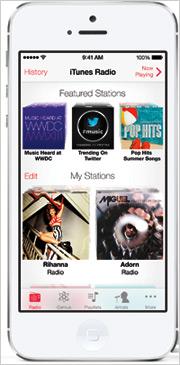New Streaming Rival: Apple To Launch iTunes Radio
- by Mark Walsh @markfwal, June 10, 2013
 As
expected, Apple on Monday announced plans to launch an online radio service that could shake up the burgeoning
mobile music market. The new ad-supported service, dubbed iTunes Radio, is part of the sweeping overhaul of the company’s mobile operating system unveiled today at its annual developer
conference.
As
expected, Apple on Monday announced plans to launch an online radio service that could shake up the burgeoning
mobile music market. The new ad-supported service, dubbed iTunes Radio, is part of the sweeping overhaul of the company’s mobile operating system unveiled today at its annual developer
conference.
Scheduled to debut this fall, iTunes Radio will compete with a range of popular music streaming services, such as Pandora and Spotify, as well as Google’s new digital music offering. The new service should also give a boost to Apple’s iAd mobile ad network, which will serve ads in the new offering.
The announcement comes just days after reports that the iPhone maker had reached a deal with Sony Music Entertainment, the last of the three major labels it needed to sign up for the initiative along with Warner Music Group and Universal Music Group. It also notched a deal with Sony/ATV, the world’s largest music publisher.
Like Pandora, iTunes Radio will stream music selections tailored to users’ preferences according to different artists, genres, or songs, as well as offering a set of featured stations by genre. The stations that users create become more personalized over time based on the music they play or download via iTunes.
The new service also integrates Siri -- Apple’s virtual assistant feature -- and promises the ability to tag or buy anything playing with one click, along with exclusive access to “first listen” premieres from top artists. While the ad-supported service is free for all users, subscribers to Apple’s iTunes Match service -- which costs $24.99 a year -- will get ad-free access.
Because of Apple’s dominance of the paid digital music market through iTunes, and the 600 million iOS users worldwide, its entrance into music streaming could have a major impact on the emerging arena. iTunes Radio is seen as posing a threat to Pandora in particular, because it adopts the same free, ad-based model for online radio listening.
Spotify and Google’s new music-streaming service, by contrast, rely mainly on a subscription-based service in which users pay a monthly fee for on-demand streaming.
With more than 70 million active listeners, Pandora is by far the largest Internet radio player to date, with revenue in its fiscal first quarter rising 55% to $125 million.
Russ Crupnick, senior vice president, industry analysis at NPD Group, noted in a recent blog post that Pandora has also earned high customer satisfaction ratings from users. Furthermore, about 80% of Pandora’s listening hours comes though mobile devices, and Apple’s service would be limited to the iPhone’s less than 40% share of the U.S. smartphone market.
With music listening increasingly shifting to mobile devices, Apple and other companies want to ensure they don’t miss an opportunity with streaming. Nearly half (48%) of U.S. smartphone users listen to music on their handsets, according to comScore. Plus, eMarketer estimates 96 million people, or 30% of the population, are expected to stream music this year on mobile devices.
In addition to helping to maintain customer loyalty, iTunes Radio could also prove a benefit for Apple’s iAd division. While Apple didn’t specify the types of ad running in the service, Ad Age last week reported it would serve both banner and audio advertising.
In a research note before the Apple announcement, Jordan Rohan, an analyst with Stifel, Nicolaus & Co., suggested Apple might be better suited to selling national radio ads than Pandora, which has focused on building up its local ad sales force. Mobile advertising is still a tiny portion of Apple’s overall revenue, expected to total just $219 million this year, according to eMarketer.


